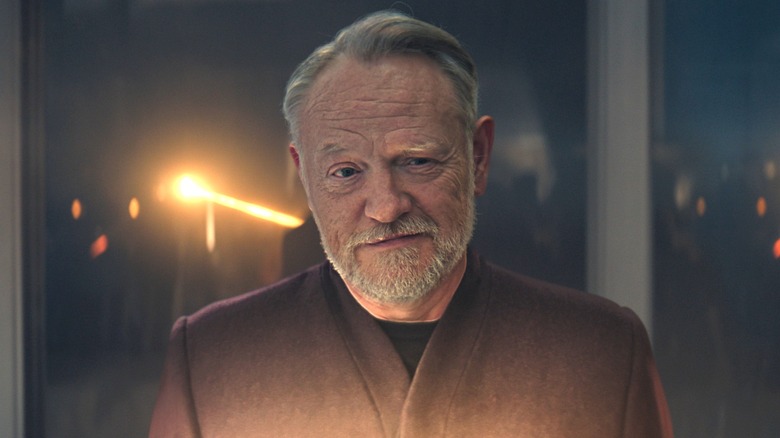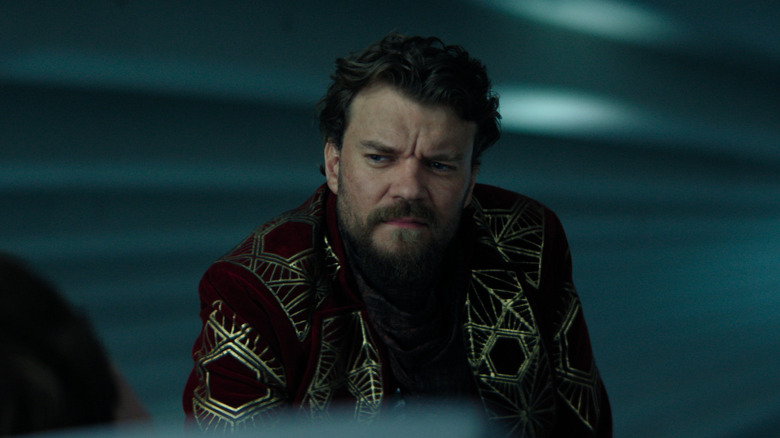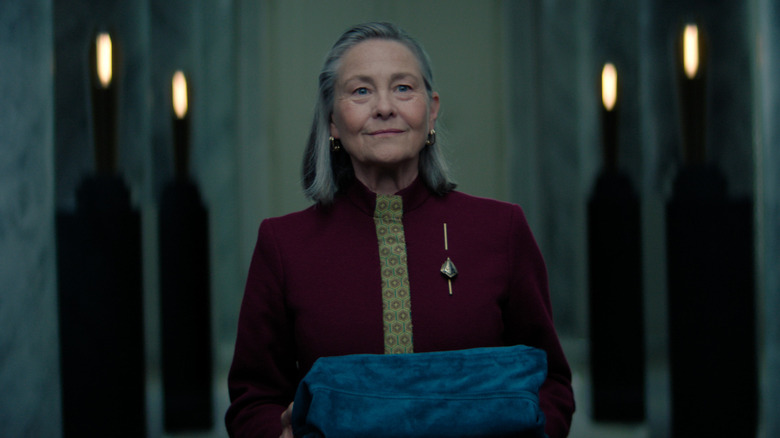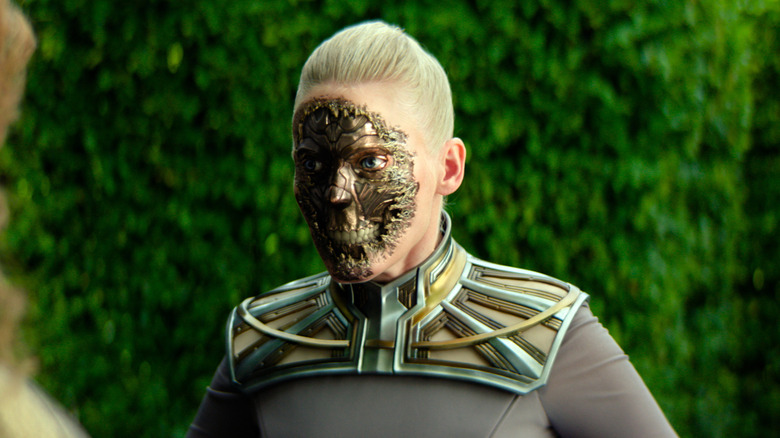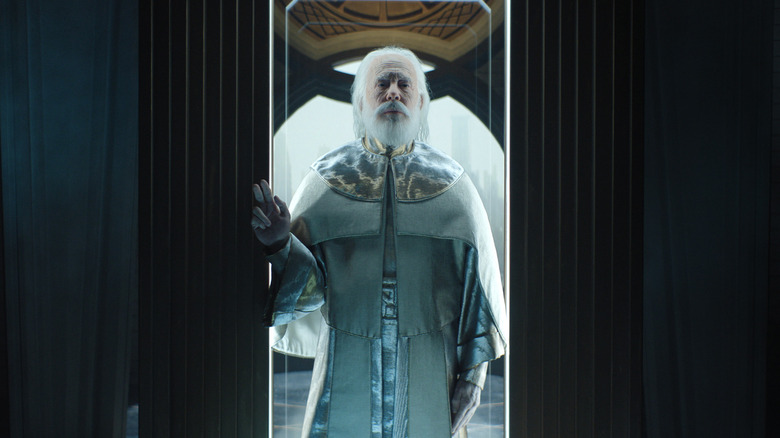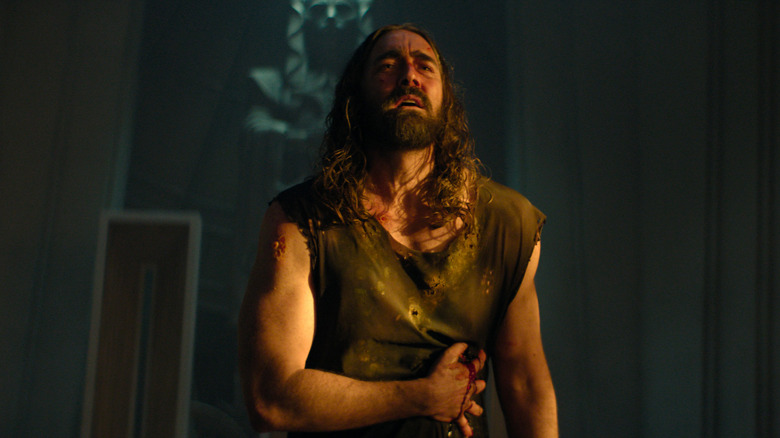Foundation Showrunner On Those Finale Twists And A Lesson Learned From The Dark Knight Films [Exclusive Interview]
The following contains heavy spoilers for season 3 of "Foundation."
The third season of "Foundation" on Apple TV+ can best be described as a proper sci-fi epic. Based on the seminal book series of the same name by Isaac Asimov, the third season of the show tells a story full of spectacle (like a planet-killing Death Star that puts at least one "Star Wars" movie to shame), but also plenty of complex philosophical contemplations about the nature of humanity, fate, and artificial intelligence. This is the season that fully combined the universe of Asimov's "Foundation" with the universe of his "Robot" novels, exponentially expanding the scope of the story to cover millennia.
Creator and showrunner David S. Goyer and his team have achieved something similar to what Denis Villeneuve did with his "Dune" movies by taking a work of literature previously thought of as unadaptable and bringing it to the screen. Like Villeneuve, Goyer and his team take a lot of liberties with the source material, making substantial changes that make "Foundation" its own thing while still keeping many of the core ideas and plots of the books.
Whether it's changing the identity of The Mule, killing beloved characters, or making big revelations about the nature of the show's universe, season 3 of "Foundation" feels like a culmination of many of the adaptation's ideas so far. Still, the season left us with a lot of questions about the changes to the source material, some of the big story moments in the finale, and what comes next.
I recently sat down with Goyer ahead of the season 3 finale of "Foundation" to discuss some of the season's biggest moments, and Goyer's hopes for a spin-off all about robots.
Note: This interview has been lightly edited for clarity and brevity.
Foundation showrunner explains the Mule twist in the season 3 finale
I want to start with a big topic: The Mule. I know you've been very excited to tackle this story, and I'm curious if you can talk a bit about the approach to the character and the storyline from the start, of showing us the pirate as this separate character who we believe to be the Mule, and then we can get into the twist at the end.
Well, when the second book came out, I think it was 1951 or 1952, the reveal in the book that Magnifico was the Mule was regarded as this massive surprise. And I think I read "Foundation" for the first time in the 1980s when I was in high school, and I wasn't that surprised by the reveal, in part because if you have a mystery, you need suspects for who the killer can be. You need red herrings.
In Asimov's story, they talked about this character, the Mule. They mentioned this pirate, this warlord. They said that he was imposing, that he could kill you with his look and things like that, but it all happened off-screen or out of the text. So I wasn't that surprised as a reader when I got to the reveal that Magnifico was the Mule, because there just weren't a lot of other viable suspects to point to.
So the first thing I decided when we were adapting this for film was that — audiences are very sophisticated now, since "Game of Thrones" and all sorts of things, now that we've had these large, novelistic, serialized stories. And with a show like "Foundation," where our audience has been trained to look for little clues or twists and turns, I knew that if we didn't create a real, viable red herring — in this case with the pirate of Kalgan, the warlord — that people would guess the reveal almost immediately.
So the first decision I made was that the red herring character of the pirate cannot exist off-screen. We need to see him. We need to believe that he is this antagonist. Then I thought about the reveal that it was Magnifico, and we've got two sets of audiences that watch the show: We've got the people that have read the books, and the people that haven't read the books. And even though the people that have read the books is a much smaller contingent of the audience, they're very vocal. So I started to worry about that leaking out and ruining the surprise for the people that hadn't read the books. Then I started to think about, "Well, is there anyone else in the orbit of our show that could be the Mule?" And I started to think about Bayta.
Now, when Asimov was writing, there weren't even any female characters in the first book. So Bayta was one of the first female characters introduced, and she was very likable. And even in his book, she was perhaps a bit more canny than Toran was, but I started to wonder, "Well, what if she were the Mule?" And even though we've come a long way since the 1950s, I still think audiences tend to underestimate female characters, and when we think of who the big bad guy is, we think, "Oh, it's got to be a Thanos-like character. It's got to be Doctor Doom. It can't be this sort of unassuming, seemingly shallow social media influencer."
So that started to become appealing to me, and then I started to think that it would be interesting if in building up ... she was smart enough to know that in building up the pirate, she almost deliberately created a clichéd villain character to distract attention away from what she was doing. That seemed right to me and surprising to me. And I would contend that if Asimov were alive today, he would have been quite tickled with that reveal. So that's something that I just thought was perhaps, with the distance of time, possibly a more sophisticated reveal for the Mule than what Asimov had written back in '51.
How Foundation keeps things fresh while adhering to the spirit of Asimov's books
Right, because it's also not just the reveal itself and how cool it is to be surprised, no matter how familiar you are with the books, but it's also, it does something to the character to have that motivation of, she's seeking people to love her and to love each other rather than just, "I'm going to conquer the universe just for the sake of it."
Yeah. Yes. Yeah. It's her belief, right or wrong, that a lot of the classic male conquerors got it wrong or just were sort of destroying things to destroy things, and she doesn't necessarily want to destroy things. I'm not saying she's benevolent. She's a very twisted character. But I think she's used that as a justification for why what she's doing is better than what the Empire is doing or better than what Hari Seldon is doing.
Now, I'm very, very curious when you mentioned both the approach of wanting to keep the surprise for non-book readers and for book readers, but also sort of thinking of, "What if the books were made today?", in a way. What is that approach like in the grander scheme while making the show, and planning season by season? Where do you find that balance in terms of, "We're keeping the core ideas and the core plot points, while still trying to make something fresh and new"?
Look, these shows don't exist in a vacuum. The source material was written 70 years ago. A lot of other books and TV shows and movies have strip-mined some of the ideas — Star Wars, Star Trek, things like that — and it used to be that science fiction was almost entirely a male audience, and largely a white male audience, and that audience has grown, and it's gotten more acceptance as a legitimate genre, both in film and in television. These things don't exist in a vacuum.
I think you have to look at why the source material is important historically, what elements still speak to today as a society — and it's not just technology that's changed. They have this thing called the Overton window, which is ideas that may not have been socially acceptable 20 years ago gradually, over the course of time, become more acceptable, whether that be gay marriage, whether that be women serving in the Army, all sorts of things. The legalization of marijuana.
So society changes and grows over time. I think even if we had set "Foundation," like they did with the new "Fantastic Four," in some kind of fictionalized version of the 1960s, the audience that's watching it is more sophisticated than the audience that was consuming "Foundation" 70 years ago. You have to take all these considerations to heart.
How Foundation was able to incorporate I, Robot content into its narrative
I absolutely love the Demerzel story, and I know there were some rights issues at the very start about how much you guys could adapt. What was the original approach to the character before you got that sorted, and how did you start weaving in more of the Daneel storyline and more of the "Robot" stories as you could? How did that plan change into what we are seeing now?
Well, the approach didn't really change. Originally, it was Josh Friedman who started developing the show with me. When we were first approached to do "Foundation," we were given a document that outlined the characters that we had exclusive rights to, and it turned out — because later on in his career, Asimov took the "Foundation" stories and the "I, Robot" stories and sort of retroactively combined them into the same universe. They were in separate universes to begin with, and then he sort of mixed them up and had one of the characters from "I, Robot" appear in the later "Foundation" books. So we were given a document that said, "These characters, you can exploit exclusively. These are characters that appear in both universes that, in this case, Fox had the rights to the 'I, Robot' books, and these are characters that you cannot use at all, because they are exclusive to the 'I, Robot' books."
So they said that we could reference Demerzel's backstory as a generalization, but we couldn't use the character Daneel and we couldn't name some of the characters from "I, Robot" by name. And so, I said, "That's fine. We'll be a little coy with some of these references to her in the past." But then what happened was I was producing a movie for Fox, "The First Omen," which is a prequel to "The Omen," and the head of Fox, Steve Asbell, is a big science fiction fan and specifically a big Asimov fan, and he was a big fan of the show.
So we were at a sound mix of the movie, and he was talking about the show and how much he liked the show, and asking me questions about it on opportunity, and I said, "You know, you could help me out here. You could give us a one-time allowance to mention the character of Daneel in season 3 and, for the fans, to tie that officially back in."
So he had the business affairs department at Fox do just that and give us permission to do it. But it was a lucky happenstance, because I literally happened to be in a room with the head of Fox, and he was a fan of the show, and sometimes that synchronicity in Hollywood works to your benefit.
So did that happen before you started working on season 3?
We were writing season 3 at the time. We were in the middle of writing it.
Right. So you didn't have an alternate plan how to ... because that's a very big aspect of both Demerzel's and Brother Day's storyline this season.
Yeah. That plan was still in existence, but we couldn't mention Daneel by name. We could be vague about it, but we couldn't mention Daneel by name.
With or without the specificity of the names, how was it to explore that in this season and not just give us as much of the complete story of Demerzel as you possibly could, but also tied in specifically to Day's story this season, which I think is one of the best things about the season as a whole?
Well, I knew that when we start each season, typically before the writers' room assembles, I write up a document, a five- or six-page document, which is just sort of an info dump of everything I'm thinking about for the season, about all the big, large plotlines. Over the course of the first three seasons, the final version of the season ended up relatively close [to that]. 80%.
And then once the writers' room would convene, I would say to the other writers, "Do you have any thoughts on this? Should we change this? Should we change that?" And sometimes one of my fellow writers will come up with a better idea or a better way to do it so we'll change that. But the broad strokes, I knew that I wanted the season to be, from the Emperor's storyline, I wanted it to be about the actual fall of Empire and Demerzel's freedom, and I also wanted it to be about Day's redemption.
The irony is, he does go from being a truly selfish person to being a much more selfless person, into having empathy for Demerzel, which is a character that he had grown to hate, because he had felt that she was, in a way, their warden, and they were all prisoners of her. But what he comes to realize is the emperors themselves, Cleon I, was the one that made her a prisoner, and thus imprisoned all of them. So, it wasn't by choice.
And the irony is that even though Day comes to that realization and Day has the opportunity to free her by bringing the robot skull and escaping from Mycogen, that's taken away from both of them, because Dusk intercedes and kills her so that the act that actually frees her is Dusk destroying the clone tanks. Because once the clone tanks and that baby are dead, there's no genetic dynasty anymore. There's nothing to protect.
So the irony is she would also have been free there, but Dusk doesn't believe, once she's free, that she would be on his side, necessarily. So he comes up with this idea to both destroy her and the clone tanks. I just like the tragic irony of Day changing as a character and becoming selfless and Demerzel being free, but the moment she's free is also the moment that she dies.
Foundation season 3 gives Terrence Mann a new color to play
Can you talk a bit about specifically having Dusk be the one to destroy the Empire, at least the way we know it, and to be the one to fulfill Seldon's predictions?
It just came about because I thought it would be the most unexpected. I think based on the two previous seasons, they might have expected Dawn to be the one to do it, to break away, because he's always been attempting to break away, and he is attempting to break away, and Dusk has always been largely the character who's been maintaining the status quo and counseling prudence. So I thought it would be more surprising.
And one of the other notions is that because of this tainting of the genetic dynasty, it's become harder and harder and harder for them to — they're starting to sort of go their separate ways and individuate genetically and individuate in terms of their ... so it's harder and harder and harder to keep things in stasis.
So I just try to come up with what would be the most surprising or what would be something interesting, or in the case of Terry [Mann], Terry is a wonderful actor. What I also like to do in between seasons is look at our actors and say, "Well, what's something we haven't seen them do before so that we can see a different color?" And generally, he's been, generally, kind of a bit funnier and played this sort of wiser consigliere, and I thought, "Well, what if he's just an absolute motherf***er instead?"
In the finale, we see the confrontation of Gaal and the Mule, both the pirate and the actual Mule. What is the status or the vision that she's had since season 2 of her fight with the Mule? Was this it? Is it still sort of a future thing because the pirate was Bayta? I'm curious if you can talk a bit about that.
Well, one thing we learned from the end of season 2, Gaal saw a vision of this confrontation, and she saw Salvor dead in this confrontation, and then Salvor died through a different means at the end of season 2. So what that meant, and it's important for a show that's about predicting the future, is because the question that we were positing is, "Is the future that the Prime Radiant is predicting, is it absolutely going to happen, or is it not going to happen? And then are Gaal's dreams going to happen, or are they not going to happen?"
What we've landed on at the end of season 2 is Salvor dying in the present as opposed to the future. What we're definitively saying is, the future is not on rails. That is a possible future. That is potentially the most likely future, but it's not the only future. And so, even though it was tragic for Salvor to die, the gift of Salvor's death is that it means the future can change, that there's still hope. So by killing the pirate, what that means is she's definitely not going to be fighting that pirate in the ruins of the library, but she could still be fighting someone. It could be Bayta. We don't know yet.
I also wanted to ask about the final scene in the season where we see Kalle, which is one of the most fascinating characters in the show that we know basically nothing about, and I'm curious about bringing that in now. I know you talked in the past about wanting to at least originally cover up to season 4, cover the first three books in the series, and then going to the next ones after that. So I'm curious about bringing that in and showing the Earth and the Moon at this particular point in time.
So the original plan was that was not something we were going to show potentially until the end of season 4 or the beginning of season 5. But one of the things that's lovely about a television show as opposed to a movie, if you get more than one season, is there is an ability, to a certain extent, to adjust in real time. We have a relationship with the audience, and you're seeing what's working, what's not working, and you can also decide ... we have an expectation that we can keep certain mysteries withheld for a certain period of time, four seasons, five seasons.
But we've adjusted that as we've gone along, and we've decided, "You know what?" It just felt that it was time to start turning over that card with Kalle. So that was brought forward. That doesn't necessarily mean that the show will last for less seasons. But when I was working with Chris Nolan on the Batman movies and we were talking about ... We were beating up "Batman Begins" or "The Dark Knight," and we would come up with an idea and say, "Oh, that would be good to use for another movie if there's another movie." And Chris would always say, "Let's just use it now. We don't know if we're going to get another movie."
Champagne problems if we have to worry about, "Oh, we use that idea now. Now what do we do next?" Let's just have confidence that we'll come up with something that's interesting after that. So to a certain extent as the showrunner on "Foundation," what I was doing, kind of like the Foundation itself is sort of adjusting the math as we go. Yes, there's a plan, but in real time, we're adjusting it here and there.
David S. Goyer still wants to make a Robot Wars show
Having exited the show now, can you talk a bit about your planned approach to specifically the latter book, which I think gets really, really weird, especially for a TV show. Can you tell me how you would have approached that?
Well, look, I personally feel that ... there's a total of seven books, I believe. There's the original trilogy and then two sequels, and then two prequels, but he never got to the end of the story. He ran out of gas. He didn't write the prequels and sequels until 20, 30 years after the original trilogy, which is not to say that we wouldn't adapt some of those elements or haven't adapted some of those elements. Demerzel does not appear in the original trilogy. She appears in the prequels, or it appears in the prequels. It's not a man or a woman. It's a robot.
But I think that those first three books are stronger than the other books. Now, there are many fans that love the other books just as much. I don't think they're as strong. I think there's great ideas, some great characters in them, but some of it starts, to me personally, to get a little too abstract. Again, that's not to say that we wouldn't bring in elements from those. We have, and the show will continue to do so.
But I also know that he never finished this story. He had a line or two where he was thinking about what would happen when we actually got to the end, when the Foundation's mission had finished, and he never got to it. It's one of the reasons why he went back and wrote the prequels instead of finishing it first, because he kind of had writer's block.
Some people would argue that I didn't stay close enough to the original trilogy, although I would argue it's very hard to adapt that first book, which is just a series of short stories that are only loosely connected to one another. But the way that I like to think of it is, what the MCU is to the Marvel Comics canon, our show is the MCU version of "Foundation." So it tracks along to a certain extent, but at a certain point, it also takes on a life of its own that's slightly separate from the books.
Right. So season 4, at least in your original plans for it and just the covering of the first three books and with how we end things, you've talked about wanting to cover the Mule in two seasons. Having made such big tangents up to now, just structurally, why it was important for you to have the Mule be two whole seasons and just sort of not stick into a particular formula for each season, but making it adaptable to what the story is saying?
Well, I think that, in part, the story of the Mule is a ... the first two seasons are adapting short stories and novellas, but the story of the Mule is a proper novel. I think Asimov became a better writer. There's a beginning. There's a middle and an end, to a certain extent. I think the characters are much more fleshed out than in the first sort of book and a half. It's also easier to adapt than the first two were.
You don't want to fall into a rut, and as we started planning out the season, I thought, "I don't think I can tell this story properly in a whole season. So let's do something unexpected now and only time jump a week or two in between seasons." Doesn't mean that we wouldn't go back in season 5 or so on, do another big time jump, but it just meant this particular time. I mean, as originally planned, I was thinking seasons 3 and 4 would connect together and largely be one massive season, and the same with seven and eight. That could change, but that's what I was thinking.
Lastly, you have mentioned ideas that you had about a potential Robot Wars miniseries, and I'm wondering if you can talk about your take on it and why that is appealing to you for an expansion of this universe.
Well, I would love to tell that story, but there's really only two ways to tell it. One would be to tell it as a — which is possible, and we've talked about it — as a sort of B-story interwoven into a season, where we would do these flashbacks, which would be interesting, but would take up a lot of time and a lot of bandwidth.
So, if we were really to devote a lot of time to that, it would take at least three hours of the 10-hour story. So I thought maybe another interesting way to do it would be to do it as like a six-episode miniseries that happens in between two of the larger seasons of "Foundation." So just drop it right in between. But who knows if that will ever happen? It was, in success, something that would have been exciting, and to be able to stretch our arms and really give that... I don't think that story is required to enjoy "Foundation" as a show, but it would be fun to do it.
"Foundation" season 3 is streaming now on Apple TV+, and season 4 has officially received a greenlight.
